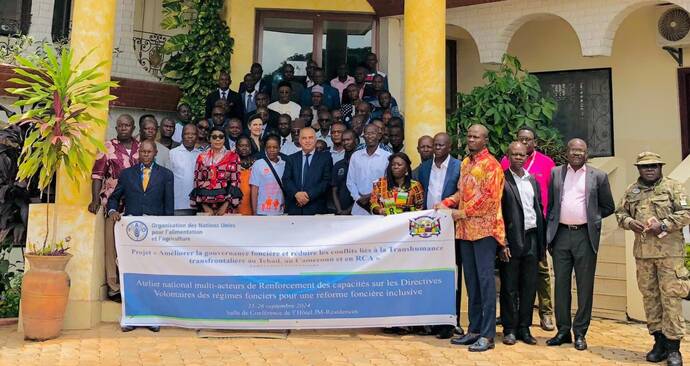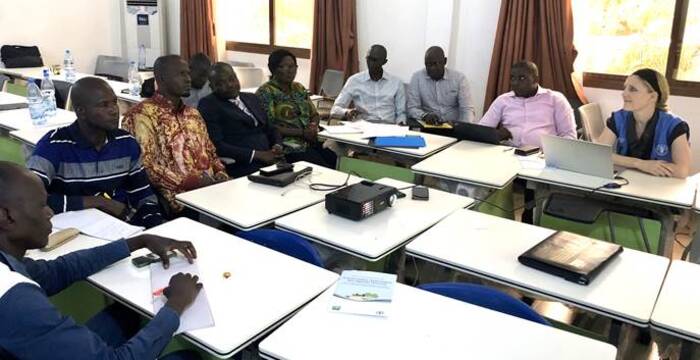Other articles
Promoting responsible and inclusive land governance through MSP in Sierra Leone
Sierra Leone embraces a Human Rights Based approach to land governance assessment
FAO and Partners advancing Inclusive Land reforms at the 2023 African Land Policy Conference
FAO supported the National Forum on Land Tenure in Cotonou
FAO supports the launch of the Pacific Land Network (PLaNet)
Chad validates its National Land Policy
Towards an inclusive land reform in Mauritania
More secure land tenure in Senegal lays the groundwork for agroecology and women empowerment
FAO supports a historic land tenure forum in Guinea
Land Tenure and Sustainable Agri-Food Systems
Open Tenure Trainings with UN-REDD in RDC and Colombia
Geospatial Information for Digital Transformation conference, 27-29 October, Oslo
Land tenure continues to be major objective of development agenda
Mainstreaming VGGT in revision of 2013 Land Law in Viet Nam for more responsible tenure governance
Passage of long-awaited tenure reform in Niger
Sharing land law knowledge in Southeast Asia
What COVID movement restriction means for nomadic pastoralists in the Sahel
Chinese investments in agricultural land in Africa
Land governance in Colombia's protected areas
ECOWAS embraces the Voluntary Guidelines
FAO launches a new project to improve land governance and reduce conflicts in the Central African Republic

- Opening of the Multi-stakeholder workshop in Bangui, September 24, 2024.
The launch workshop for the project entitled "Improving land governance and reducing conflicts related to cross-border transhumance in the Republic of Chad, the Republic of Cameroon, and the Central African Republic" took place on 24th and 25th September 2024, under the auspices of the Minister of urban planning, land reform, cities, and housing of the Central African Republic.
Funded by the FAO's Flexible Voluntary Contribution, this project promotes the strengthening of land governance skills among national and local actors in the three countries. It is based on the Voluntary Guidelines on the Responsible Governance of Tenure of Land, Fisheries and Forests in the Context of National Food Security (VGGT).
The project focuses on supporting inclusive land reform processes by engaging multiple stakeholders involved in land management, including farmers, livestock herders, and nature conservation organizations, as well as surveyors, notaries, and lawyers. The initiative encourages the sharing of experiences and tools that can contribute to reducing conflicts related to cross-border transhumance.
In her opening speech, the Minister stated that this project comes at a crucial time, as initiatives are underway to create the conditions for optimised management of the national land heritage. These reforms include addressing transhumance and agro-pastoral conflicts, which are fundamental issues, as access to natural resources is essential for the livelihoods of millions of people, including farmers and livestock herders, as well as for peace and stability in the subregion.
The Minister recalled that the Central African Republic does not have a land policy that provides a vision and guidelines for managing its land heritage. She explained that land governance falls under several ministerial departments, each with specific responsibilities in their respective fields, leading to the adoption of multiple overlapping, and even contradictory, sectoral laws. According to the Minister, it is essential to conduct an inclusive process of reflection on the issue to establish an inclusive governance system for the Central African land heritage. She welcomed the FAO's support in helping the country develop a national land policy.

- Group work session during the Multi-stakeholder workshop in Bangui, September 24, 2024.
During the workshop, group sessions were held to assess the use of the VGGT in the land reform process in the Central African Republic. Participants also conducted an analysis of the strengths, weaknesses, opportunities, and challenges of the land reform in the country. They also validated the national roadmap for engaging in an inclusive land reform process. The next step involves implementing this roadmap, starting with the development of the land policy and the establishment of a multi-stakeholder platform to guide this inclusive and participatory process.
Finally, to strengthen the partnership around land reform, a roundtable was organised with representatives from the FAO, the African Union, the European Union, the United Nations High Commissioner for refugees, and Oxfam. This roundtable established a framework for consultation among partners, with the aim of coordinating actions related to land governance in the Central African Republic.
